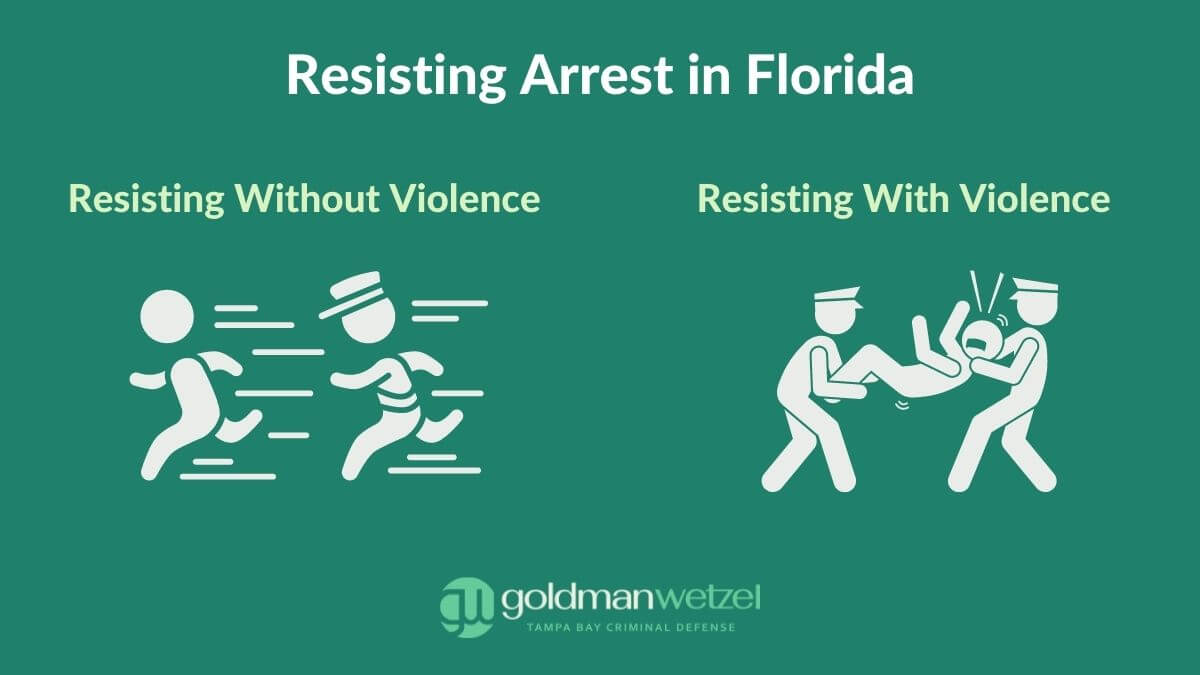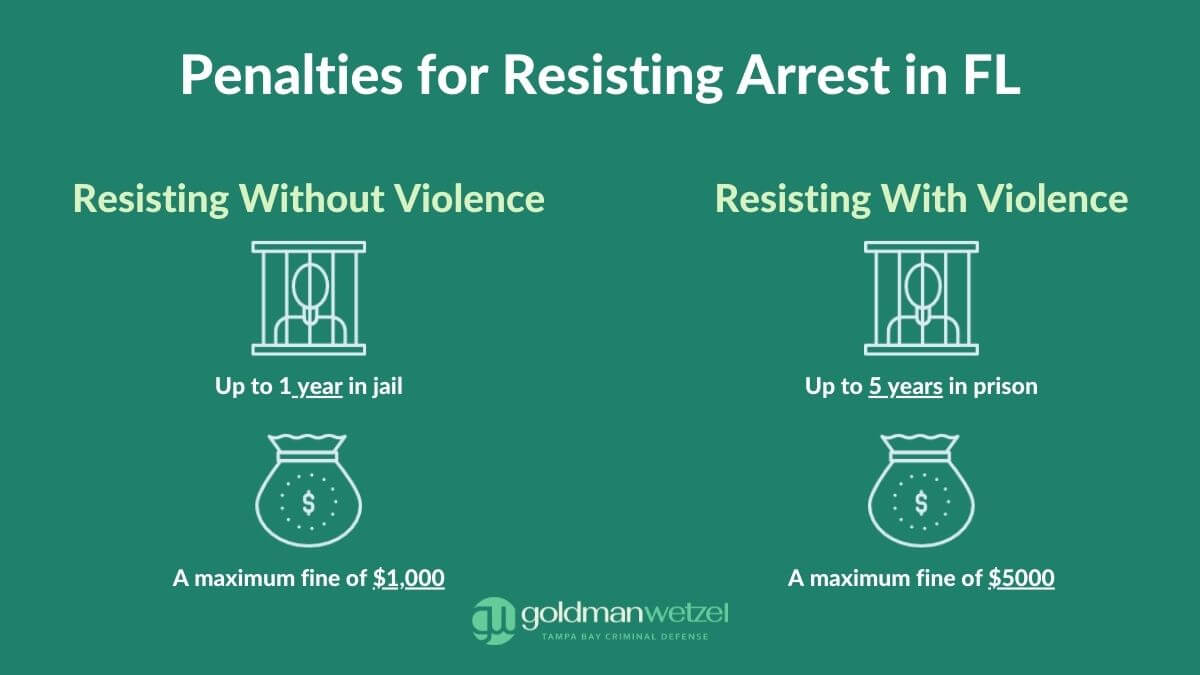Facing a potential arrest can be a stressful situation. Regardless of how overwhelming this can be, you should remain calm and avoid arguing or obstructing any law enforcement officer. If you fail to do this, you could be charged with a count of resisting arrest in Florida.
Given that this offense can be vague and confusing, the following sections will provide essential information about Florida laws for resisting arrest. In addition to definitions, we will discuss the elements of this crime, the penalties associated with it, and some potential defenses.
Even if you think you are being unfairly arrested, resisting a police officer can result in criminal charges. If you or a loved one were arrested in Florida and are accused of resisting such arrest, you have the right to call a criminal defense attorney. Call 727-828-3900 to book a free consultation.
Resisting Arrest in Florida: Definitions & Laws
Resisting arrest in Florida is a criminal offense because it is classified as a form of obstruction of justice. In other words, when resisting law enforcement officers, you are preventing them from executing their legal duties. As a result, you could face criminal charges for this action.
Florida Statute § 843.02 describes that resisting an officer occurs when people obstruct, oppose or resist any authorized law enforcement officer during the performance of their duties. Depending on the circumstances, this offense can be classified as:
- Resisting arrest without violence
- Resisting arrest with violence

Resisting arrest with violence involves using physical force against the law enforcement officer. Despite this, the definition of resisting arrest in Florida can be vague and gives officers the opportunity to charge people at their discretion.
Some examples of situations where you could be charged with resisting law enforcement include, but are not limited to:
- Using physical force to avoid being arrested
- Refusing to stop when requested by a law enforcement officer
- Giving false or misleading information to an officer
- Avoiding the arrest of a suspect
- Verbally refusing to be arrested
However, even if you are charged with this offense, the prosecution must prove certain elements beyond reasonable doubt to convict you for this crime. Such elements are:
- You resisted, obstructed, or opposed law enforcement.
- The officer was an authorized law enforcement officer and was engaged in executing a legal duty.
- You knew that you were resisting a law enforcement officer.
Can you resist an unlawful arrest in Florida?
In Florida, law enforcement officers are authorized to arrest a person without a warrant under certain circumstances. When being unlawfully detained, it may not be in a person’s best interests to resist the arrest since this action can result in additional criminal charges.
If you were unlawfully arrested in Florida, you should still remain calm and retain a criminal defense attorney as soon as possible. A lawyer can help you determine if your arrest was illegal and the next legal steps that you may want to take.
When it comes to resisting arrest charges in Florida, it is key for the prosecution to establish that the law enforcement officer was executing a legal duty rather than a regular job activity. According to case law, these legal duties include:
- Legally detaining a person;
- Asking for assistance with an ongoing emergency;
- Serving process.
If your defense attorney is able to prove that you were charged for resisting an unlawful arrest without violence in Florida, your charges may be dropped. To explore the best legal path for your case, you should consult a criminal defense lawyer.
Examples of resisting arrest in Florida
Jay v. State
Tyrone Jay was arrested by a police officer during a sting operation. During this operation, the officer was attempting to solicit two women, and Jay warned them that the man was a police officer. As a result, the two women walked away and were not arrested even though the police officer knew that one of them was a prostitute.
The officer wanted to arrest Jay for obstruction of justice, and Jay fled. After being caught, the defendant was charged with:
- Resisting an officer without violence
- Possession of a weapon by a convicted felon
The defense argued that Jay did not obstruct the officer because there was no evidence that the women had committed a crime. The fact that the officer attempted to solicit does not prove that the females would do something illegal. As a result, the defendant’s warning did not obstruct the execution of any legal duty.
Even though this was during a “sting operation”, it was proven that the officer was not engaged in the execution of a legal duty. Instead, he was merely on the job. Because the legal elements of resisting arrest in Florida were not met, the defense concluded that:
- The arrest was unlawful.
- Jay was free to resist the arrest without violence.
- The charge for possession of a weapon should be suppressed because it resulted from an unlawful arrest.
The defense appealed and remanded to the trial court based on these findings.
Punishments for Resisting Arrest in Florida
In Florida, a charge for resisting arrest ranges from a first-degree misdemeanor to a third-degree felony. The charges associated with this crime vary depending on the severity of the offense.
For instance, resisting without violence is classified as a misdemeanor of the first degree. This means that if a person is convicted of this crime, he or she could serve up to 1 year in county jail and pay a fine of up to $1,000.
On the other hand, resisting arrest with violence is a Level 5 offense in Florida. Since it is considered a third degree felony, the punishments for this offense include up to 5 years imprisonment and a fine of up to $5,000.

Under the current law, even if you resisted multiple officers simultaneously, you will only face one count of resisting arrest. If you are unsure of what your charges mean and their potential penalties, contact the attorneys at Goldman Wetzel.
Potential Defenses for Resisting an Arrest
The potential defenses that a criminal lawyer may be able to use depend on the circumstances of your case. Some defenses for this type of case include, but are not limited to:
- There was no obstruction of justice: If it is suitable for your case, your attorney may try to prove that your actions before the arrest did not obstruct the officer’s legal duties.
- Unlawful arrest: Police officers are allowed to legally arrest you under certain circumstances. However, if these circumstances are not met and you were unlawfully arrested, your defense may focus on demonstrating that you did not commit a criminal offense because the arrest was illegal in the first place.
- Self-defense: If an officer used excessive force against you during the arrest, your attorney may use this to demonstrate that your use of force was a self-defense action.
- Lack of knowledge: As established by Florida law, the prosecution needs to prove that the defendant knew that he or she was resisting a law enforcement officer. However, if officers failed to identify themselves, your criminal lawyer may be able to argue that you did not know that you were resisting an officer.
Contact a Florida Criminal Defense Attorney
Resisting arrest in Florida is a criminal offense that can lead to severe punishments. In some cases, having early representation can help your attorney negotiate with the prosecutor to reduce your sentence or have your charges dismissed.
Goldman Wetzel is a criminal defense law firm with 3 offices in St. Petersburg, Tampa and Bradenton. With over 20 years of experience, we represent clients facing criminal charges in the Tampa Bay Area. If you wish to speak to a criminal defense attorney, call 727-828-3900 to book a free consultation.

